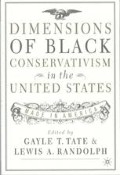Abstract
Throughout the woman suffrage movement, African American spokeswomen and their male supporters refuted the conservative anti-woman suffrage arguments. They discredited these views made mainly by individual white males and females in their antisuffrage organizations. They also responded to the argument of those African Americans who questioned the motives of early twentieth-century white suffragists or who doubted how effective woman suffrage goals could be to blacks. Woman suffrage, like all controversial issues, had its skeptics and its opponents. The antisuffrage argument was based on the belief that women did not need, did not want, or could not handle the responsibility of voting.
Access this chapter
Tax calculation will be finalised at checkout
Purchases are for personal use only
Preview
Unable to display preview. Download preview PDF.
Notes
See Miriam Gurko, The Ladies of Seneca Falls: The Birth of the Woman s Rights Movement (New York: MacMillan Publishing Co., 1974), p. 215
Carrie Chapmen Catt and Nettie Rogers Shuler, Woman Suffrage and Politics: The Inner Story of the Suffrage Movement (New York: Charles Scribner’s Sons, 1926), pp. 54–60
Robert L. Allen and Pamela P Allen, Reluctant Reformers: Movements in the United States (Washington, D.C.: Howard University Press, 1974), pp. 142
Marjorie Spruill Wheeler, New Women of the New South: The Leaders of the Woman Suffrage Movement in the Southern States (New York: Oxford University Press, 1993), pp. 101–2.
U.S. Department of the Interior, Eleventh Census, 1890, 1:3, (Washington, D.C.: U.S. GPO, 1890), p. 166
Bettina Aptheker, Woman s Legacy: Essays on Race, Sex, and Class in American History (Amherst: University of Massachusetts Press, 1982), chap.3
Suzanne Lebsock, “Woman Suffrage and White Supremacy: A Virginia Case Study”, in Visible Women, edited by Nancy A. Hewitt and Suzanne Lebsock (Urbana: University of Illinois Press, 1993), pp. 75–76.
Elizabeth Cady Stanton et al. eds., The History of Woman Suffrage (hereafter HWS) (New York: Fowler and Wells, 1881–1882), 2:94–95
Woman’s Era, 2 (August 1985): 19; HWS 4:216, 246; James M. McPherson, Abolitionist Legacy: From Reconstruction to the NAACP (Princeton: Princeton University Press, 1975), pp. 320–21.
Ida B. Wells-Barnett, Crusade for Justice: The Autobiography of Ida B. Wells, ed. by Al-freda Duster (Chicago: University of Chicago Press, 1970), p. 230.
McPherson, Abolitionist Legacy, p. 319–320. “Educated suffrage” continued to be popular among white suffragists in the twentieth century. See, for example, Margaret Deland, “The Third Way in Woman Suffrage”, Ladies Home Journal, 30 (January 1913): pp. 11–12.
Adele Logan Alexander, “Adella Hunt Logan, the Tuskegee Woman’s Club and African American Women in the Woman Suffrage Movement”, in Votes for Women: the Woman Suffrage Movement in Tennessee, the South and the Nation, ed. Marjorie Spruill Wheeler (Knoxville: University of Tennessee Press, 1995), p. 102
See: Negro Year Book, 1918 (Tuskegee: Tuskegee Institute, 1918–1921); and Womans Era, 1894–1897; Aileen Kraditor, The Ideas of the Woman Suffrage Movement, 1890–1920 (Garden City, NY: Anchor Books, 1971), p. 213.
Adella Hunt Logan, “Woman Suffrage”, Colored American Magazine, 9 (September 1905): p. 487.
Lillian A. Turner, “Votes for Housewives”, The Crisis, 10 (August 1915): 192
Mary E. Jackson, “The Self-Supporting Woman and the Ballot”, The Crisis, 10 (August 1915): 187.
Francis Grimke, “The Logic of Woman Suffrage”, The Crisis, 10 (August 1915): 178–79.
Benjamin Brawley, “Politics and Womanliness”, The Crisis, 10 (August 1915): 179.
Kelly Miller, “The Risk of Woman Suffrage”, The Crisis, 11 (November 1915): 37.
Kathy A. Perkins, “Mae Miller”, in Black Women in America: An Historical Encyclopedia, ed. Darlene Clark Hine, Elsa Barkley Brown, and Rosalyn Terborg-Penn (Bloomington: Indiana University Press, 1994), 2
Mary Church Terrell, “The Justice of Women Suffrage”, The Crisis, 4 (September 1912): 191.
Ibid.; Coralee Franklin Cook, “Votes for Mothers”, The Crisis, 10 (August 1915): 185.
David Morgan, Suffragists and Democrats: The Politics of Woman Suffrage in America (East Lansing: Michigan State University Press, 1972), p. 92
Kenneth R. Johnson, “White Racial Attitudes as a Factor in the Arguments Against the Nineteenth Amendment”, Phylon 31 (Spring 1970): 31–32
Editor information
Editors and Affiliations
Copyright information
© 2002 Gayle T. Tate and Lewis A. Randolph
About this chapter
Cite this chapter
Terborg-Penn, R. (2002). The Politics of the Anti-Woman Suffrage Agenda: African Americans Respond to Conservatism. In: Tate, G.T., Randolph, L.A. (eds) Dimensions of Black Conservatism in the United States. Palgrave Macmillan, New York. https://doi.org/10.1057/9780230108158_5
Download citation
DOI: https://doi.org/10.1057/9780230108158_5
Publisher Name: Palgrave Macmillan, New York
Print ISBN: 978-0-312-29370-3
Online ISBN: 978-0-230-10815-8
eBook Packages: Palgrave Social & Cultural Studies CollectionSocial Sciences (R0)

